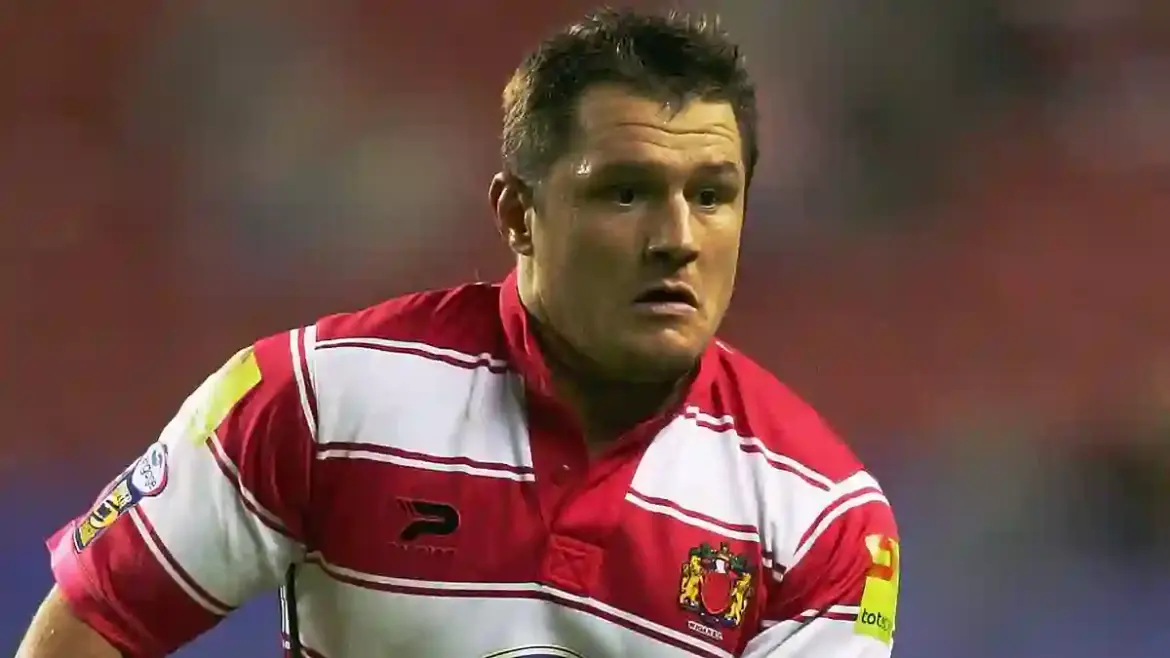It’s hard to forget the name Terry Newton, even 15 years after his passing.
For those who knew him, he wasn’t just a rugby league player — he was a whirlwind of energy, a jokester, and a teammate who could light up a room.
Yet behind that infectious personality lay struggles no one could see, and for his friends and family, the question remains: could they have known he was about to take his own life?
The Last Messages: Signs They Missed
Newton’s final texts to his Wigan Warriors teammates seemed, on the surface, like classic Tez humor.
To prop Terry O’Connor, he joked about considering “a career in crime” after rugby — a line that, at the time, seemed perfectly in character.
To another teammate, he offered to sell a watch.
These were the kinds of playful, unpredictable interactions fans and teammates had come to expect.
Yet looking back now, those messages sting with a different weight.
Was there a hidden cry for help behind the laughter? A veiled message of despair at the end of a brilliant career? No one realized, because Newton’s personality was so vibrant, so irrepressible, that his inner struggles were invisible.
A Life of Contrasts: The Boy and the Man
Newton was a kid at heart, full of pranks and mischief.
One of his signature moves was abruptly ending calls with a cheeky “got to go, the police are behind me!” He was a man before his time in the rugby world, joining Leeds in the Super League at just 18 and becoming a feared opponent for Australian teams in international play.
Yet even the strongest athletes can hide pain beneath the surface.
Ordinary Days, Hidden Pain
The day before his death, Newton was busy with everyday tasks, helping out at a pub he ran with his father-in-law.
Picking up beer and auction prizes for a fundraiser seemed like mundane errands — yet they were the final activities of a man whose struggles remained invisible.
Chris Brookes, a close friend and now Wigan Warriors chairman, recalls there were “no signs, no real alerts.”
National Suicide Prevention Day: Turning Grief Into Action
In recognition of the ongoing struggle with mental health, the Warriors opened a community garden at their training ground on National Suicide Prevention Day.
The garden is designed to be a safe space for conversations about mental health, something Newton never felt able to have.
Coach Matt Peet, who has led Wigan to multiple Super League titles and other victories, addressed the squad with a simple, powerful message: “I do not care if we don’t win or don’t take another trophy.
This is the most important thing: looking after one another.”
The room was silent, every player absorbing the weight of the reminder.
Wigan’s Mental Health Crisis
The need for such conversations in Wigan is stark.
The town has the highest male suicide rate in Britain, with many residents facing economic hardship, childhood poverty, and social isolation.
Fifteen percent of men report having no close friendships or anyone to confide in.
The Warriors hope that by setting an example, they can encourage their community to look out for one another.
Personal Stories Bring the Message Home
During the day of reflection, players met local residents who had experienced similar tragedies.
Nina Smith spoke about losing her brother Will to suicide in 2021, describing the helplessness of not knowing how to intervene.
Stories like hers illustrate how vital it is to spot the signs of mental distress early.
Understanding Newton’s Struggles
Newton’s personal challenges were profound.
He lost his younger sister, Leanne, to heroin addiction, and his own career ended in disgrace after a doping ban.
In his ghost-written autobiography, he candidly described the pain of telling his loved ones about the ban — yet even in this unfiltered account, there were no clear warnings of the darkness that would follow.
A Lasting Legacy: The Community Garden
The Warriors’ community garden serves as a lasting tribute to Newton, with a wall where visitors can leave messages of encouragement.
Newton’s father, Tony, contributes regularly, reflecting on the subtle changes he noticed in his son before his death.
“Rugby players are big men with big shoulders, but even they can’t carry the weight of the world on their own,” he says.
The hope is that the garden, along with the Warriors’ open discussion about mental health, will create a culture of awareness and support — both in sport and across the town.
Looking Forward
Newton’s story is a reminder of how critical it is to recognize mental health struggles, especially among men in high-pressure environments.
By sharing his story, Wigan Warriors are encouraging both their squad and the wider community to speak openly, support each other, and never underestimate the power of a listening ear.
